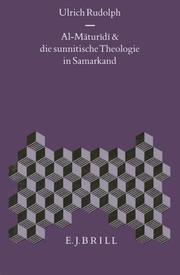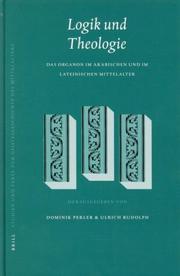| Listing 1 - 10 of 22 | << page >> |
Sort by
|

ISBN: 9004100237 9004452133 Year: 1997 Volume: 30 Publisher: Leiden Brill
Abstract | Keywords | Export | Availability | Bookmark
 Loading...
Loading...Choose an application
- Reference Manager
- EndNote
- RefWorks (Direct export to RefWorks)
Islam --- Māturīdīyah. --- Doctrines --- History. --- Māturīdī, Muḥammad ibn Muḥammad, --- Māturīdīyah --- Maturidiyya --- Mohammedanism --- Muhammadanism --- Muslimism --- Mussulmanism --- Religions --- Muslims --- Doctrines&delete& --- History --- Māturīdī, Muḥammad ibn Muḥammad, --- Abu Mansour Mohammad ben Mahmoud al Maturidi al-Samarkandi, --- Abū Manṣūr al-Māturīdī, --- Abu Mansur al-Moturidiĭ Samarqanda, --- Abu Mansur Muḣammad al-Moturidiĭ as-Samarqandiĭ, --- Abu Mansur Muhammad ibn Muhammad al-Hanafiy al-Maturidi as-Samarkandi, --- Abu Mansur Muḣammad ibn Muḣammad ibn Maḣmud al-Ḣanafiĭ al-Moturidiĭ as-Samarqandiĭ, --- Abu Mansur Mukhammad ibn Mukhammad al-Khanafi al-Moturidi, --- Abu Mansur Mukhammad ibn Mukhammad ibn Makhmud al-Khanafi al-Aʺlam ul-Khuda al-Mutakallim al-Moturidi as-Samarkandi, --- Māturīdī, Abū Manṣūr, --- Mâtürı̂dı̂, Ebû Mansûr, --- Moturidi, --- Moturidiĭ, --- Moturidiy, --- Muḥammad ibn Muḥammad al-Māturīdī, --- Muhammad ibn Muhammad ibn Mahmud Abu Mansur al-Samarqandi al-Maturidi al-Hanafi, --- Mukhammad ibn Mukhammad ibn Makhmud Abu Mansur al-Moturidi as-Samarkandi, --- ماتريدي، محمد بن محمد --- ماتريدي، محمد بن محمد، --- Samarkand (Ouzbékistan) --- Al-Maturidi, Muhammad ibn Muhammad
Book
ISBN: 9783406508523 Year: 2013 Publisher: München : Beck,
Abstract | Keywords | Export | Availability | Bookmark
 Loading...
Loading...Choose an application
- Reference Manager
- EndNote
- RefWorks (Direct export to RefWorks)
Islamische Philosophie --- Islamische Philosophie --- Islamische Philosophie --- Islamische Philosophie. --- Geschichte.
Book
ISBN: 9783110534061 9783110535945 9783110534092 Year: 2022 Publisher: Berlin De Gruyter
Abstract | Keywords | Export | Availability | Bookmark
 Loading...
Loading...Choose an application
- Reference Manager
- EndNote
- RefWorks (Direct export to RefWorks)
History of philosophy --- Islam --- Farabi, al-, Abu-Nasr Muhammad Ibn-Muhammad
Book
ISBN: 9783835351424 3835351427 Year: 2022 Publisher: Göttingen Wallstein
Abstract | Keywords | Export | Availability | Bookmark
 Loading...
Loading...Choose an application
- Reference Manager
- EndNote
- RefWorks (Direct export to RefWorks)
Tunis im 13. Jahrhundert nach Christus: Der aus Katalonien stammende Dominikaner Raimundus Martini (gest. nach 1284) hält sich mehr als zehn Jahre in der Stadt auf, um Arabisch zu lernen und sich an der Mission dort lebender Muslime zu beteiligen. Ob er dabei erfolgreich war, wissen wir nicht. Doch nachweisbar ist, dass Raimundus seine neuen Sprachkenntnisse nutzte, um arabische Texte zu Philosophie und Theologie im Original zu studieren, die zuvor nie ins Lateinische übersetzt wurden. Seine Rezeption dieser Ideen und Lehren fand Ausdruck in seinem Hauptwerk 'Pugio fidei' ('Der Dolch des Glaubens'). Besonders ungewöhnlich: Bei aller Kritik an der islamischen Philosophie, die Raimundus als problematisch begreift, zeigt er so manche Sympathie für Argumente islamischer Theologen, seiner Konkurrenten. Ulrich Rudolph untersucht die Geschichte dieser interreligiösen Rezeption. Sein Essay beginnt mit einem Blick auf die politische Konstellation am Mittelmeer im späten 13. Jahrhundert, thematisiert den allgemeinen Stand der arabisch-lateinischen Übersetzungen zu dieser Zeit und beleuchtet den Fall des 'Pugio fidei', der auch für den heutigen interreligiösen Diskurs anregend sein kann.
Missions to Muslims --- Christianity and other religions --- Islam --- Relations --- Christianity --- Martí, Ramón --- Tunis (Tunisia) --- Religion
Book
ISBN: 3406508529 Year: 2004 Publisher: München Beck
Abstract | Keywords | Export | Availability | Bookmark
 Loading...
Loading...Choose an application
- Reference Manager
- EndNote
- RefWorks (Direct export to RefWorks)
Article
Abstract | Keywords | Export | Availability | Bookmark
 Loading...
Loading...Choose an application
- Reference Manager
- EndNote
- RefWorks (Direct export to RefWorks)
Book
ISBN: 3525825072 9783525825075 Year: 2000 Volume: 235 Publisher: Göttingen Vandenhoeck und Ruprecht
Abstract | Keywords | Export | Availability | Bookmark
 Loading...
Loading...Choose an application
- Reference Manager
- EndNote
- RefWorks (Direct export to RefWorks)
Occasionalism. --- Causation. --- Philosophy, Medieval --- Islamic philosophy --- Philosophy, Renaissance --- Occasionnalisme --- Causalité --- Philosophie médiévale --- Philosophie islamique --- Philosophie de la Renaissance --- Occasionalism --- Philosophy, Islamic --- Philosophy, European --- History.. --- History. --- -Philosophy, European --- -Philosophy, Islamic --- -Arabic philosophy --- Muslim philosophy --- Philosophy, Arab --- European philosophy --- Causation --- Dualism --- Fate and fatalism --- God --- Matter --- Mind and body --- History --- -History. --- Causalité --- Philosophie médiévale --- Occasionalism - History.. --- Philosophy, Islamic - History. --- Philosophy, European - History. --- Causalite --- Philosophie arabe
Book
ISSN: 02497980 ISBN: 9782711625932 2711625931 Year: 2014 Publisher: Paris : Libr. philosophique J. Vrin,
Abstract | Keywords | Export | Availability | Bookmark
 Loading...
Loading...Choose an application
- Reference Manager
- EndNote
- RefWorks (Direct export to RefWorks)
Ulrich Rudolph retrace de manière concise et claire l’histoire de la philosophie dans le monde islamique. Sa présentation commence avec le processus des traductions gréco-arabes, puis il se concentre sur les auteurs importants, qui ont été, pour l’essentiel, lus en Europe également (Avicenne, Averroès, etc.). Ensuite, il traite des développements ultérieurs dans l’empire ottoman ou en Iran pendant les temps modernes. Un état des lieux des tendances actuelles de la philosophie islamique vient clore cet ouvrage

ISSN: 01698028 ISBN: 9004111182 9786610859030 1435655826 9047403983 1280859032 1433704706 9789004111189 9781435655829 9781433704703 Year: 2005 Volume: 84 Publisher: Leiden Brill
Abstract | Keywords | Export | Availability | Bookmark
 Loading...
Loading...Choose an application
- Reference Manager
- EndNote
- RefWorks (Direct export to RefWorks)
How did the reception of Aristotelian logic in the Arabic and Latin Middle Ages shape the development of theology? And how did theological issues influence the debates about logic and theories of argumentation? The contributions in this volume examine these questions on the basis of key texts, thus shedding new light on the problematic relationship between logic and theology.
Muslim logicians --- Islam and philosophy --- Logic, Medieval --- Catholic Church and philosophy --- History --- Congresses. --- Aristotle. --- 215.1 --- 215.1 Verhouding godsdienst en filosofie --- Verhouding godsdienst en filosofie --- Logiciens musulmans --- Islam et philosophie --- Logique médiévale --- Congresses --- Congrès --- Histoire --- Islamic logicians --- Logicians, Muslim --- Logicians --- Medieval logic --- Philosophy and Islam --- Philosophy --- Philosophy and the Catholic Church --- Philosophy and religion --- Aristotle --- To 1500 --- Logic [Medieval ] --- Aristotle. - Organon
Book
ISBN: 9004261842 9789004261846 9789004234154 9004234152 132234857X Year: 2015 Publisher: Boston Leiden
Abstract | Keywords | Export | Availability | Bookmark
 Loading...
Loading...Choose an application
- Reference Manager
- EndNote
- RefWorks (Direct export to RefWorks)
Al-Māturīdī (d. 944 CE), the prominent Hanafi scholar from Samarqand, succeeded in formulating a theological doctrine which is widely accepted in Sunni Islam to this day. The present volume which is a revised English translation of the German original published in 1997 examines his teachings by describing their principal characteristics and situating them in the history of kalām. Part one investigates the development of Hanafi thought in Transoxania before Māturīdī's time. Part two deals with the other religious groups (in particular the Mu'tazilites) which emerged in this area during his lifetime. Part three shows how he explained and defended the position of his predecessors; in doing so, he reformed their traditional views, thereby developing his own theology which then became the basis of a new tradition, viz. the Māturīdite school.
Islam --- Māturīdīyah. --- Maturidiyya --- Mohammedanism --- Muhammadanism --- Muslimism --- Mussulmanism --- Religions --- Muslims --- Doctrines --- History. --- Maturidi Muḥammad ibn Muḥammad, --- Abu Mansour Mohammad ben Mahmoud al Maturidi al-Samarkandi, --- Abū Manṣūr al-Māturīdī, --- Abu Mansur al-Moturidiĭ Samarqanda, --- Abu Mansur Muḣammad al-Moturidiĭ as-Samarqandiĭ, --- Abu Mansur Muhammad ibn Muhammad al-Hanafiy al-Maturidi as-Samarkandi, --- Abu Mansur Muḣammad ibn Muḣammad ibn Maḣmud al-Ḣanafiĭ al-Moturidiĭ as-Samarqandiĭ, --- Abu Mansur Mukhammad ibn Mukhammad al-Khanafi al-Moturidi, --- Abu Mansur Mukhammad ibn Mukhammad ibn Makhmud al-Khanafi al-Aʺlam ul-Khuda al-Mutakallim al-Moturidi as-Samarkandi, --- Māturīdī, Abū Manṣūr, --- Mâtürı̂dı̂, Ebû Mansûr, --- Māturīdī, Muḥammad ibn Muḥammad, --- Moturidi, --- Moturidiĭ, --- Moturidiy, --- Muḥammad ibn Muḥammad al-Māturīdī, --- Muhammad ibn Muhammad ibn Mahmud Abu Mansur al-Samarqandi al-Maturidi al-Hanafi, --- Mukhammad ibn Mukhammad ibn Makhmud Abu Mansur al-Moturidi as-Samarkandi, --- ماتريدي، محمد بن محمد --- ماتريدي، محمد بن محمد،
| Listing 1 - 10 of 22 | << page >> |
Sort by
|

 Search
Search Feedback
Feedback About UniCat
About UniCat  Help
Help News
News